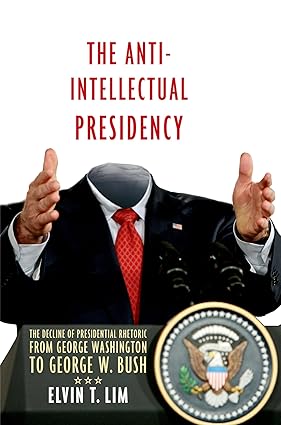Last week as I watched President Biden and President Trump exchange childish insults about their weight and golf swing, I thought of an article I wrote back in 2015 for the Colson Center, “The Dumbing Down of Political Rhetoric.” Drawing on the work of political scientist, Elvin Lim, I argued that America has witnessed a steady decline in political rhetoric due to speeches and debating points designed to maximize applause, stroke the emotions, and appeal to our intuitions. What we saw last Thursday may well be the culmination of this race to the bottom. Honestly, it’s hard to imagine things becoming any more farcical than this:
From my 2015 Colson Center article:
Someone who has chronicled the gradual dumbing-down of American political discourse is Elvin T. Lim, political scientist from Wesleyan University. His 2008 publication The Anti-Intellectual Presidency: The Decline of Presidential Rhetoric from George Washington to George W. Bush, looks specifically at presidential speeches, yet his observations have relevance across the spectrum of our nation’s political discussions.
Professor Lim points out that the speeches given by presidents are increasingly filled with vacuous statements that do not invite rational disputation. Speeches are designed to maximize applause lines, stroke the emotions and appeal to our intuitions, while being lean on substantive content. As such, presidential rhetoric completely bypasses the type of higher order thought necessary for proper analysis.
Lim has amassed an impressive array of evidence to chronicle the steady dumbing-down of Presidential rhetoric. He calls this dumbing-down process “anti-intellectualism”, and with good reason. He contrasts it with the classical understanding of rhetoric. For the ancients, good rhetoric included logos (the weighing and judging of reasons for a particular course of action), ethos (the credibility of the speaker) and pathos (emotional appeal). “Presidential rhetoric today” Lim writes, “is short on logos, disingenuous on ethos, and long on pathos.”
On November 1st, 2015, I followed up that Colson Center article with the first in what became a series of articles on Donald Trump. But in that first article on the (now) former president, I noted something that was clearly underscored in last week’s debate, namely that Trump appeals to Americans not in spite of being thoughtless, but precisely because he does not come across as thoughtful and reflective.
Americans have a long history of a kind of pragmatism that grows weary of too much complexity and intellectualism. This is reflected in our voting practices and perhaps explains why Americans were susceptible to a simple and unsophisticated candidate like Warren Harding after a complex intellectual like Woodrow Wilson nearly ruined the world, or why George W. Bush seemed attractive after the corruption of a slick president like Bill Clinton. Perhaps once again Americans have been “primed” to desperately desire a keep-it-simple-stupid-pragmatist. One typical voter recently observed, “Intellectuals make simple things complicated, and FAIL in real life. Because while real life may be complicated, you create progress by making it simple. By getting things done. Stop thinking, start doing. Stop considering, make a decision.”
Donald Trump may be the epitome of this type of anti-intellectualism. When Donald Trump speaks to the American people in a way that has been observed to be “brash, blunt and direct — and speaking at the level of a fourth grader”, he is echoing what the Americans want to hear. Because we are pragmatists at heart, we want simplicity rather than abstractions; because we are egalitarians at heart, we want someone who sounds like “one of us.” Trump satisfies these criteria to a tea.
The book of Proverbs warns us against the folly of what it calls “simplicity”, which it continually contrasts with wisdom. To the degree that Americans value simplicity more than wisdom, Trump may be the candidate we deserve.
Of course, there are other important issues raised by the debate, such as President Biden’s dementia. But the issue here is not merely that his dementia makes him non-electable, nor even that the White House has been lying to us for the past year. Ultimately, it has pulled back the curtain on the Democrat’s denial of reality. From Rod Dreher’s substack earlier today:
It is delicious to read and watch so many liberal journalists expressing shock that the Biden White House lied to them about the president’s mental fitness. Anybody who reads conservative media, or who simply follows Twitter, has been able to see plainly, for a long time, that Joe Biden is incapacitated by age and dementia. But they really do seem to have believed that Narrative Defines Reality….
If Biden’s dementia comes as news to anybody in the US, it’s because the media have shielded the American people from it. If they had made an issue of it long ago, actually reporting the news, the Democratic Party could have had time to assess the situation and pivot to save itself by seeking to force Biden off the ballot in time to replace him with a candidate capable of taking the fight effectively to Donald Trump. But this information could not circulate through the system properly, because both the media did not want to report it, and because liberal elites did not want to believe it. Liberal pundit Ezra Klein in the NYT today:
In February, I argued that President Biden should step aside in the 2024 election and Democrats should do what political parties did in presidential elections until the 1970s: choose a ticket at their convention. In public, the backlash I got from top Democrats was fierce. I was a bed-wetter living in an Aaron Sorkin fantasyland.
It is true that the same Narrative Blindness exists on the MAGA Right. This is why the Republicans have, over the past few cycles, nominated in some winnable constituencies MAGA wack-jobs over GOP candidates who stood a chance of victory. But this whataboutism doesn’t do the Democratic Party any good only four months away from a presidential election, does it?



